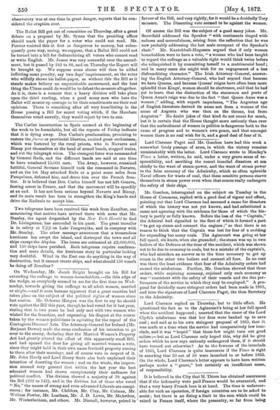Of course the Bill was the subject of a good
many jokes. Mr. Scourfield addressed the Speaker " with sentiments tinged with sadness and mournfulness, arising from the reflection that he was now probably addressing the last male occupant of the Speaker's chair." Mr. Knatchbull-Hugessen argued that if only women householders were to have a vote, " a woman who had been taught to regard the suffrage as a valuable right would think twice before she relinquished it by committing herself to a matrimonial bond ; and in many cases she might wish for an engagement of a less disfranchising character." The Irish Attorney-General, answer- ing the English Attorney-General, who had argued that because we have Queens, and because Queens' reigns have often been more splendid than Kings', women should be electresses, said that he had yet to learn that the distinction of the statesmen and poets of Queen Anne's reign was due to the fact " that Queen Anne was a woman ;" adding, with superb impudence, "The Augustan age- of English literature derived its name not from a woman of the name of Augusta who was then on the throne, but from Augustus." No doubt jokes of that kind do not count for much, but it is certain that the House thought more seriously than ever that the embroilment of women in politics is dangerous both to the cause of progress and to women's own peace, and that amongst• women there is no real wish for it, and a good deal of fear of it.


































 Previous page
Previous page